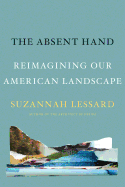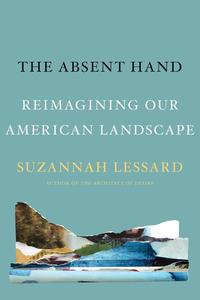
 Suzannah Lessard (The Architect of Desire) offers a broad cultural examination of place in The Absent Hand: Reimagining Our American Landscape. The result is a work of great scope that's grounded by an interest in landscapes, the forces that shape them and how they in turn reshape us. Lessard chases big mysteries. "Always behind my readings of landscapes are the questions, Where are we...? and What is our relationship to our surroundings now?"
Suzannah Lessard (The Architect of Desire) offers a broad cultural examination of place in The Absent Hand: Reimagining Our American Landscape. The result is a work of great scope that's grounded by an interest in landscapes, the forces that shape them and how they in turn reshape us. Lessard chases big mysteries. "Always behind my readings of landscapes are the questions, Where are we...? and What is our relationship to our surroundings now?"
Lessard begins with a close description of "the village" where she lives near Albany, N.Y. She then travels outward, to visit a nearby friend and consider suburbophobia, and therefore the history of the suburbs--as foil to the city, as military defense concept, as commercial center, as "edge city." Having considered terms like sprawl, metropolitan area, edgeless or stealth city and more, Lessard uses "atopia" to refer to landscapes "where contemporary development, directly expressing contemporary times, was unrestrained." She is also quite interested in "online" as a place, from its origins in Cold War strategy through the option it provides as escape from real places.
Lessard is at her best when handling the ways place and people interact (Disney's attempt to build a history theme park just south of Washington, D.C.), and on shakier ground when handling larger issues (market forces versus governmental powers). One of her finest chapters considers a mall in King of Prussia, Pa., and the tensions and challenges facing shopping malls across the country.
As Lessard shows, Cold War policy, the Depression, the legacy of slavery, racist housing policies, nuclear armament and more have all played roles in the development of the suburb and the contemporary landscape. Mixed in with these references, Lessard often cites works of art--Van Gogh, Shakespeare, Han vases--as means to understand place.
Lessard can speak from a place of economic comfort that may grate some readers, but the value of her decades of research is undeniable. The Absent Hand is often dense, as Lessard draws upon centuries of human history to make her arguments. In this ambitious work, place is examined, deconstructed and incrementally illuminated, even as our landscape changes anew. --Julia Kastner, librarian and blogger at pagesofjulia
Shelf Talker: This broad social-historical consideration of American landscapes will satisfy and challenge the most serious reader.

